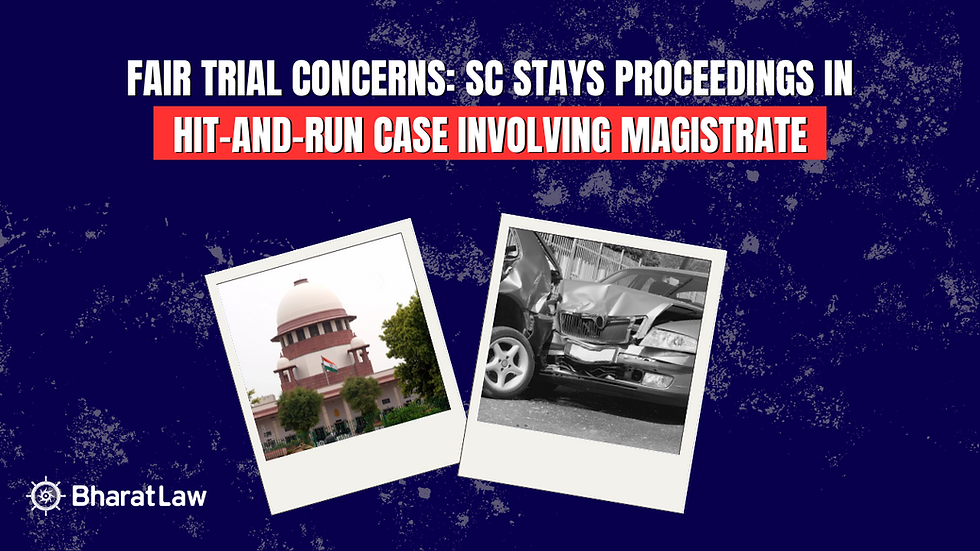Law Must Be Applied in Context, Not in a Vacuum – Supreme Court Clarifies Interim Custody of Seized Vehicles Under NDPS Act
- Chintan Shah

- Jan 8, 2025
- 4 min read
Summary of the Judgement
Case Name: Bishwajit Dey v. State of Assam
Date of Judgement: January 7, 2025
Judges: Hon’ble Justice Sanjay Karol and Hon’ble Justice Manmohan
Acts and Sections Involved:
Narcotic Drugs and Psychotropic Substances Act, 1985 (Sections 21(b), 36C, 51, 52A, 60, and 63)
Code of Criminal Procedure, 1973 (Sections 451 and 457)
Cited Judgements:
Sunderbhai Ambala Desai v. State of Gujarat, (2002) 10 SCC 283
Noor Aga v. State of Punjab & Another, (2008) 16 SCC 417
Mukesh Singh v. State (Narcotic Branch of Delhi), (2020) 10 SCC 120
Directorate of Revenue Intelligence v. Amit Kumar, 2016 SCC OnLine Del 6083
Sainaba v. State of Kerala & Another, 2022 SCC OnLine SC 1784
Introduction
In a significant judgement delivered on January 7, 2025, the Hon’ble Supreme Court of India, comprising Hon’ble Justice Sanjay Karol and Hon’ble Justice Manmohan, addressed the pivotal question of whether vehicles seized in connection with narcotics offences under the Narcotic Drugs and Psychotropic Substances Act, 1985 (NDPS Act) can be released on interim custody. The court’s decision in Bishwajit Dey v. State of Assam reconciles the provisions of the NDPS Act with the general principles of criminal law under the Code of Criminal Procedure, 1973 (CrPC), offering clarity on an issue that has seen divergent interpretations across Indian courts.
This case revolves around the seizure of a truck owned by the appellant, which was allegedly used by a third party to transport contraband substances. While the vehicle served as critical evidence in the case, the appellant argued that its indefinite retention at the police station would lead to irreparable damage and economic loss. The Supreme Court’s nuanced analysis highlights the balance between preserving evidence and safeguarding the legitimate interests of property owners, especially when there is no direct involvement in the alleged crime.
Background
The appellant, Bishwajit Dey, owned a truck used to transport goods. During a routine check, heroin weighing 24.8 grams was found hidden in the vehicle. The accused in possession of the drugs, Md. Dimpul, had no apparent connection with the appellant, who contended that neither he nor the driver had knowledge of the contraband.
The appellant sought interim custody of the vehicle under Sections 451 and 457 of the CrPC, arguing that continued exposure to the elements at the police station would render it unusable. The Gauhati High Court denied this plea, prompting the appeal.
Legal Questions
The case pivots on the following questions:
Can a seized vehicle be released on interim custody under the NDPS Act?
Does the NDPS Act prohibit invoking Sections 451 and 457 of the CrPC for interim relief?
How should courts balance evidence preservation against individual rights and economic considerations?
Court’s Observations
1. Interpretation of NDPS Act and CrPC
The court clarified that the NDPS Act does not expressly bar the application of Sections 451 and 457 of the CrPC for interim release. Quoting Hon'ble Justice Manmohan:
"The NDPS Act, being a special law, must be read harmoniously with general criminal law unless there is a direct inconsistency."
2. Conditions for Release
The court outlined scenarios under which a vehicle might or might not be released:
If the owner is implicated in the offence, release may be denied.
If the vehicle was used without the owner’s knowledge or connivance, interim custody can be granted with stringent safeguards.
3. Role of Evidence
The court acknowledged that vehicles used in narcotics transportation are material evidence but argued that technological measures (e.g., videography) can mitigate the risk of evidence degradation.
4. Absurd Outcomes
Rejecting the rigid interpretation urged by the State, the court warned against outcomes that defy logic. Hon'ble Justice Manmohan remarked:"Construing the NDPS Act to mandate indefinite seizure of conveyances would produce irrational and indefensible results that Parliament could not have intended."
Key Precedents
The court extensively analysed prior rulings, highlighting contrasting judicial interpretations. It relied on Sunderbhai Ambala Desai v. State of Gujarat, where the Supreme Court underscored the futility of indefinitely holding vehicles, and Sainaba v. State of Kerala & Another, which allowed interim custody under strict conditions.
Decision
The appeal was allowed, and the court directed the trial court to release the vehicle on the following conditions:
Preparation of a detailed inventory authenticated by all parties.
Prohibition on sale or transfer of the vehicle.
Undertaking from the owner to produce the vehicle when required.
Payment of the vehicle's assessed value if it is ultimately confiscated.
Implications
This judgement has significant implications for narcotics cases in India:
Flexibility in Interim Relief: Courts may now exercise discretion in granting interim custody of seized conveyances, balancing evidence preservation with practical considerations.
Burden of Proof: Owners of seized vehicles must prove lack of knowledge or connivance to secure release.
Precedential Value: The judgement provides clarity amidst conflicting rulings, offering guidance for lower courts handling NDPS cases.
Highlighted Quotes
"The NDPS Act, though stringent, cannot be interpreted to permit indefinite deprivation of property rights without compelling justification."
"Law must be applied in context, not in a vacuum. Courts must weigh individual circumstances against legislative intent."
Conclusion
This judgement underscores the judiciary's commitment to nuanced interpretations of statutory provisions, ensuring fairness without undermining legislative objectives. It reinforces the principle that procedural safeguards must be applied flexibly, particularly in cases where rigid adherence may produce unjust outcomes. For legal practitioners, this case reaffirms the importance of articulating individual circumstances and leveraging precedents to advocate for clients effectively.



Comments